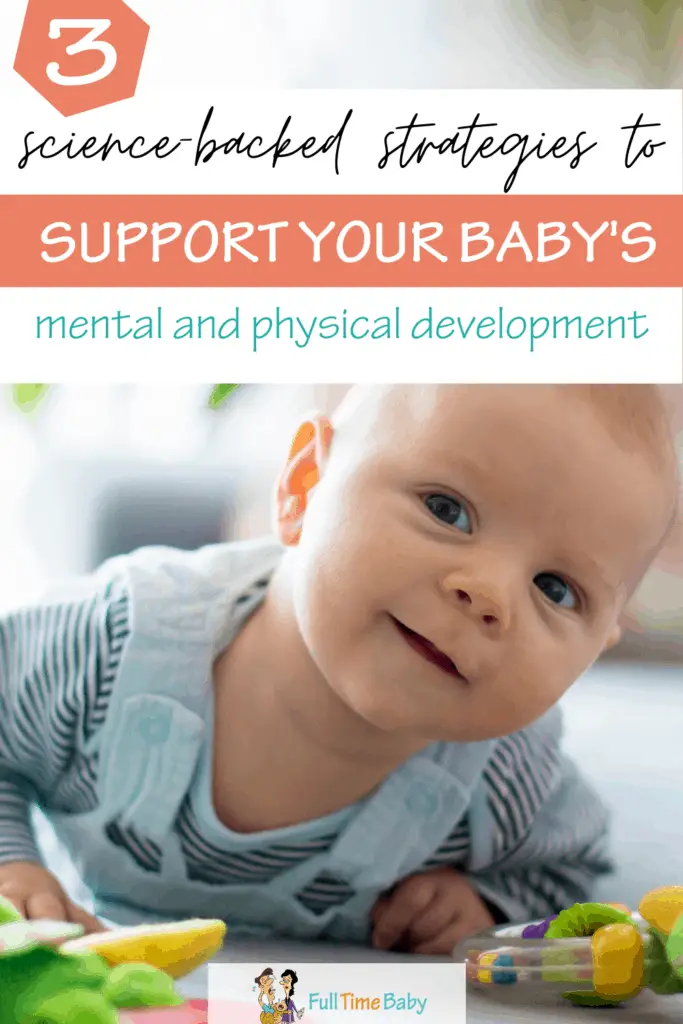As a parent, you’ve had the chance to observe your newborn infant since the first few days of life. You will have seen, beautiful although they are, that a newborn child is capable of very little. Over the first few short years of life, this tiny person will need to learn to talk, walk, and develop skills adults take for granted. Child development is rapid and astounding to witness.
The science of child development looks into how your child’s physical, mental and socio-emotional skills grow as they move out of infancy towards becoming an independent, autonomous person. This scientific research has allowed parents to understand how a child develops in so many ways in such a short time, and how they can support this development to help ensure the best possible outcomes for their children.
As a new parent with precious little time, you’ll be eager to know how your child can benefit from scientific conclusions regarding the best ways to aid your baby’s development. Thankfully, there are some simple strategies you can begin using today, at home with little equipment, that are proven to help with the mental and physical development of your baby.
1. Story Time
Some parents report feeling strange while reading to a newborn; it may feel odd, given that the infant will not be able to understand the meanings of the words at this stage. However, the act of reading not only helps parent and baby bond by exposing him/her to the soothing sound of the parent’s voice, but also helps develop vital early language skills.
At this newborn stage, you are exposing children to the sounds and patterns of language, and just a few short months down the line, your baby will begin to understand the vocabulary you are introducing through reading. It has been shown many times that by the second birthday, a child that has been read to often will have a far larger vocabulary and eventually be in a better position to learn to read at the appropriate age.
2. Peek-a-boo!
The grasping of “object permanence” is one of the most important mental developments your infant will make during infancy. In simple terms, this is the realization that objects still exist even when they are out of sight.
This strand of child development was studied in depth by psychologist Piaget in his theory of cognitive development. Eventually, a baby will be able to form a mental representation of an object without being able to see it, and this is a fundamental building block towards more mature skills such as reasoning and cause and effect.
This is the reason why peek-a-boo-type games are so popular with babies. At first, they are delighted by the idea that something that had gone has now re-appeared, and older infants enjoy games where they need to search for something that has disappeared, such as a toy under a small blanket.
The understanding of object permanence develops in babies between four and seven months old. You can help by talking or singing to your baby when out of sight, as well as peek-a-boo games. Older babies can be stimulated by adding extra challenges and variety to hidden object games, such as extra layers to uncover.
3. Baby Gym
The delight experienced when your child crawls or walks for the first time is a moment that every parent eagerly waits for, yet there may be another reason to encourage your child to reach physical milestones earlier. Researchers have recently found a possible link between early physical milestones and cognitive memory performance later in childhood.
Around three to six months is a key period of physical development for babies. Your baby will be sleeping less now and will be busy trying to work out how he can control his body. He’ll need to strengthen his arms and legs in readiness for crawling and walking, and his back for sitting up.
You can help your baby reach these incredible milestones by varying the positions you put them in on their play mat. Try placing them on their side as well as their back to encourage rolling, and vary where you sit in relation to them, too, as this will encourage them to attempt to move towards you. Placing your baby on his tummy for a short time each day is vital for core strength development as well.
Back it up with good nutrition
The key to unlocking the benefits of all these strategies is good infant nutrition. While breastfeeding is best, we know it’s not always possible. When you offer your growing baby a balanced diet full of vitamins, minerals and nutrients, you’re paving the way to on-target, optimal body and brain growth. Add to that a positive, supportive and loving environment, and your baby will have all help he or she needs to reach (or exceed!) developmental milestones today and in the coming years.


